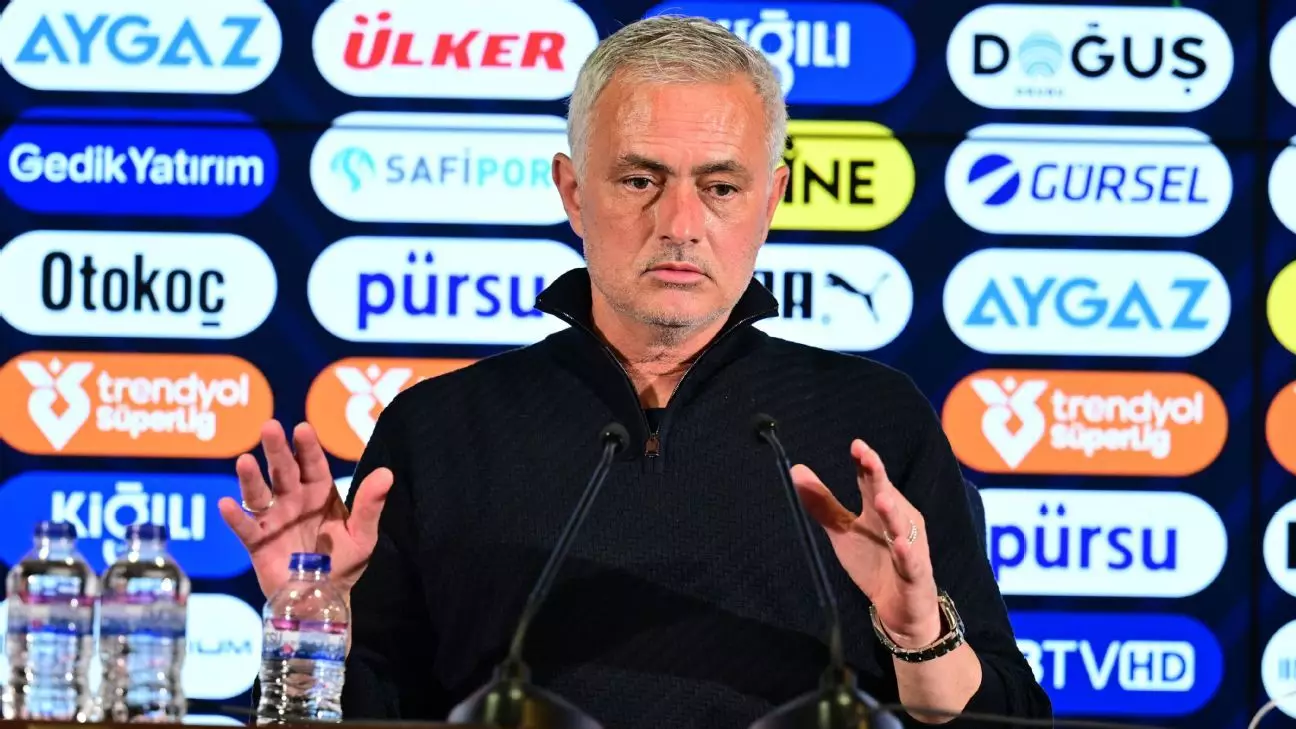Resilience in Adversity Mourinho’s Fenerbahce and the Complex World of Turkish Football
In the ever-changing landscape of football, a coach’s fate often hinges on a thin line between victory and defeat. For José Mourinho, his journey with Fenerbahce has become a tale interwoven with expectations, setbacks, and the relentless pursuit of resilience. It was just after a narrow 1-0 loss to Besiktas that the air thickened with speculation about his future. Positioned second in the Turkish Super Lig, trailing Galatasaray by eight points with only four matches left, Mourinho finds himself at a crossroads that mirrors the unpredictable nature of the sport.
Mourinho’s arrival in Turkey was marked by grand ambitions, reflective of the legendary status he brought with him. With a two-year contract signed last summer, his mission was clear: to lead Fenerbahce to their first league title in a decade. Yet, as the echoes of defeat lingered, Mourinho maintained an enigmatic stance on his future plans. “I’m not speaking about next season,” he declared, choosing to focus on internal conversations over media speculation. This careful navigation within club politics reveals both respect for structure and a catalyst for uncertainty among fans and stakeholders.
Key Takeaways
- Mourinho’s tenure at Fenerbahce is characterized by ambition and current challenges.
- The complex dynamics of Turkish football include perceived refereeing biases.
- Mourinho’s leadership reflects resilience amidst cultural expectations and pressures.
The Toxic Environment Refereeing and Rivalries
A recurring theme in Mourinho’s narrative is the “toxic environment” he perceives within Turkish football, particularly concerning refereeing biases against Fenerbahce. This perception adds a layer of complexity to an already challenging situation. The question arises: how does this perceived bias affect player performance and morale? Mourinho acknowledges that battling this entrenched system can mentally drain his team, making it difficult to achieve their goals. His lamentation about the psychological weight of these injustices highlights the disconnect between raw talent and external influences that seem beyond control.
By deliberately avoiding direct confrontation with rivals like Galatasaray, Mourinho aims to keep the focus on his team’s ambitions. However, ignoring potential favoritism within the league underscores an ongoing struggle—one that transcends tactical preparation into mental resilience. Whether his vocal criticisms will spur change or simply escalate tensions remains uncertain. It’s clear that navigating these waters requires more than just strategic acumen; it demands profound mental strength from both Mourinho and his players.
Lessons in Leadership Mourinho and Solskjær
Amidst fierce rivalry, Mourinho offered insights into his relationship with fellow manager Ole Gunnar Solskjær of Besiktas. “Ole has been here for some months now; he’s experienced enough to learn what he needs,” Mourinho noted. This moment of camaraderie amid competition offers a rare glimpse into the fraternity shared among managers. While acknowledging their mutual respect, Mourinho subtly hints at the universal challenges each manager faces in their roles. Every leader must weather their own storm, and this understanding is crucial in navigating such tumultuous environments.
Despite any external judgments, Mourinho remains unshakeable when faced with criticism from passionate Fenerbahce supporters after derby losses. “It’s normal here when results don’t meet expectations for reactions to occur,” he expressed, showing maturity that underscores true leadership and accountability. His acknowledgment of fan frustrations signifies a deep connection to the club’s mission while managing personal complexities. This blend of empathy and resolve is essential as he steers through uncertain waters.
The Cultural Landscape of Failure
Mourinho’s experiences reflect an intriguing tension between personal ambition and broader cultural expectations within Turkish football. Here, where passionate supporters live and breathe through their teams’ successes and failures, defeat intensifies scrutiny even on seasoned managers like Mourinho. The rich tapestry of Turkish football weaves together tactical brilliance with cultural desires for pride and dominance, challenging any manager who dares to traverse its terrain.
With setbacks mounting, Mourinho approaches these challenges head-on rather than shying away from responsibility. To reclaim Fenerbahce’s stature, his strategies must evolve continually amidst shifting pressures. As the league title slips further out of reach, understanding Mourinho’s philosophy becomes pivotal—not only for his future but also for restoring Fenerbahce’s lost glory within the sport. As this season progresses towards its conclusion, Turkish football remains an arena where resilience will dictate how stories unfold.
Final Thoughts
As we navigate through Mourinho’s journey with Fenerbahce amidst adversity in Turkish football’s complex world, it’s evident that resilience is more than just enduring hardship—it’s adapting and growing stronger through each challenge faced. For both fans and players alike, this chapter serves as a testament to perseverance under pressure while seeking triumph against formidable odds. Whether or not Mourinho achieves immediate success at Fenerbahce remains secondary; what truly matters is how these experiences shape him as a leader committed to excellence despite daunting circumstances.
José Mourinho
Fenerbahce
Turkish Football
Leadership
Resilience


Leave a Reply